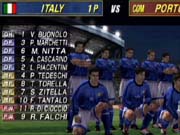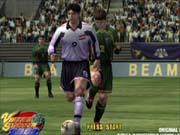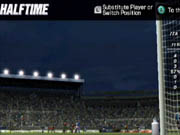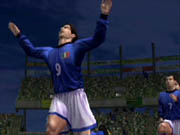Arcade sports games are their own breed. It takes a different kind of game to get people to pull another quarter from their pocket than it does to get them to remain on the couch for an extra 30 minutes playing a typical console sports game. Normally, developers recognize this distinction and tailor their games to the audience and setting that they're intended for. But with Sega's Virtua Striker 2002 for the GameCube, it's hard to tell just which gaming environment the designers had in mind for the game.

Despite the lack of any sort of formal license, Virtua Striker 2002 has plenty of gameplay modes with enough depth to compete with any soccer simulation on the market. New to the series is the "road to the international cup" mode, in which you take over every last detail of running a soccer club. You can hold a training camp, where you train each player individually according to his position and then create a schedule that includes all the friendly matches you need to prepare your team for tournament play. You'll also have a budget to manage, so determining the right time to take on overseas matches is integral to your team's success. The schedule lasts for four years, so there's plenty of time to get your team ready. In this respect, Virtua Striker 2002 is very much like a soccer management simulation. In fact, soccer junkies may enjoy just sitting back, simulating all the games, and examining how different coaching strategies and practice techniques affect the team's on-field performance.
In addition to the extremely deep international cup mode, Virtua Striker 2002 has plenty of other gameplay options to keep you busy. You can enter leagues with up to 32 humans and take part in or construct customizable tournaments, where the teams are sorted into brackets. There's even a ranking mode in which you take on the computer and are scored based on your performance. However, the multiplayer mode supports just two players, and even then, it's impossible for both players to play cooperatively on the same team. This cuts into the game's long-term replay value considerably. Regardless of which gameplay mode you choose, most of the gameplay parameters are adjustable, such as offsides, penalties, and timekeeping. Save for its anemic multiplayer modes, Virtua Striker 2002 has plenty of gameplay options to keep you busy. Unfortunately, its poor gameplay renders all of these modes nearly worthless.

Considering the Virtua Striker franchise was born in the arcades, it comes as little surprise that the gameplay involves just three buttons. But no one would guess that so little can be done with them. On offense, you have a long pass button, a short pass button, and a shoot button. There are no dekes or special moves to perform, there is no sprint option, and advanced passing techniques like give-and-gos are nowhere to be found. On defense, slide tackles are the only controllable action, and the computer automatically decides which kind of tackle is performed based upon your player's position relative to the ball and the opposing player. Because the offensive player has no move to counter the slide tackle, games quickly boil down to one steal after another. It's not out of the ordinary for each team to have more than 40 steals per match. If there were at least one offensive move to balance the slide tackle, the gameplay would be passable, but there isn't, and games quickly become a ridiculously repetitive cycle of steals. There's no flow to the gameplay at all, and getting off a pass becomes nearly impossible. Making any sort of an accurate pass is out of the question because you do not have the time to do so.

Making matters worse, on defense, the computer automatically switches players for you. While you eventually learn to anticipate the computer's player switching, the option to perform this action yourself is a prerequisite of any sports game. Virtua Striker 2002 does have on-the-fly formation and strategy changes, but this is a small consolation when the core gameplay is so poor. The game plays itself most of the time and will appeal to only those who like to make managerial moves and see how they pan out on the pitch.
Virtua Striker 2002's graphics make the game look fairly impressive superficially, but that's a double-edged sword because the visuals could also swindle someone into purchasing the game. At any rate, players on the field animate with a nice fluidity, and their momentum-based movements look believable enough. There's a variety of slide tackles in the game, though more offensive moves would be a welcome addition. But other animations, like players arguing a call, celebrating a goal, or falling down after a slide tackle, appear awkward. The game also lacks any sort of small details, like changing weather conditions or the ability to view replays whenever you choose. When the computer does show a replay on its own, you're able to see single blades of grass being kicked into the air and relatively detailed character models. There are nine different stadiums included in the game, and they provide a good variety of environments, but the pitch does not get chewed up as the match progresses, and you won't see any shadows from the top of the stadium on the field because the lighting in the game has been faked. For those with high-definition televisions, Virtua Striker 2002 displays in a nice 480p progressive-scan mode, but its graphics still can't save it from its poor gameplay.

With no play-by-play announcing and subdued crowd noise, Virtua Striker 2002 won't be turning any heads with its auditory experience. A lack of sound can be forgiven in the arcade, where it's impossible to hear anyway, but at home, this omission can make the game seem stale and impersonal. Other ambient sound effects, like player taunts, individual cheers from the crowd, or team-specific chants, are also absent. Considering how important the crowd is to international soccer, this is a glaring omission. Though the game plays in Dolby Surround, the audio in Virtua Striker 2002 does no more than the bare minimum to get by.
Virtua Striker 2002 is more of a self-running soccer simulator than a soccer game. The computer takes care of the majority of the controls, and the lack of any sort of offensive maneuvers makes the game unbalanced and leaches the fun from it. If you're the type of player who likes to tinker with player attributes, team strategies, and formations, then you might want to give Virtua Striker 2002 a rental and see if it's for you. But the rest of you should stay far away from this one--you would do better to pick up EA's FIFA game for simulation-style soccer or Sega's own Soccer Slam for arcade footie action.